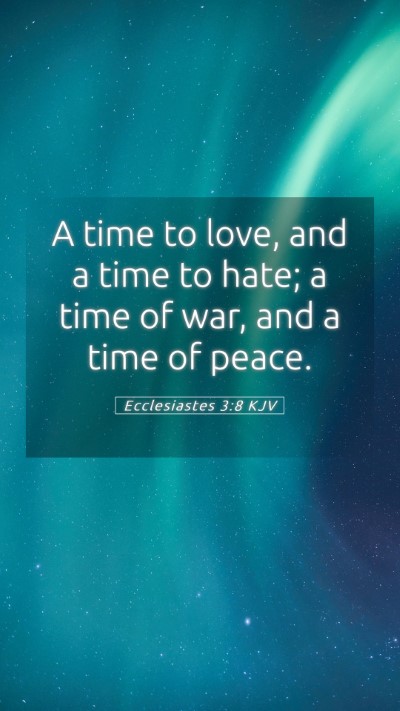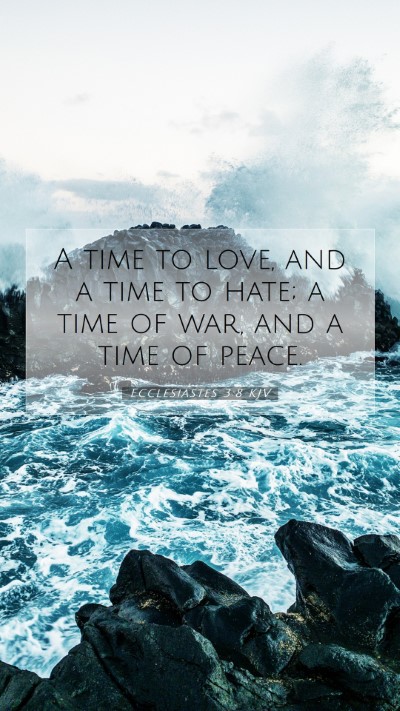Understanding Ecclesiastes 3:8: A Comprehensive Commentary
Ecclesiastes 3:8 states: "A time to love, and a time to hate; a time of war, and a time of peace." This verse captures the duality of life and the cyclical nature of human experiences. In this analysis, we will delve into its meanings and interpretations based on insights from public domain commentaries.
1. Contextual Overview
To fully grasp the significance of Ecclesiastes 3:8, it’s important to consider its context within the Book of Ecclesiastes, traditionally attributed to King Solomon. The book reflects on the meaning and purpose of life, exploring the inevitability of time and the contrasting feelings and experiences that life brings.
2. Bible Verse Analysis
- Time for Love and Hate:
Matthew Henry highlights that love and hate are powerful emotions that reflect human relationships and moral responses to the world around us. The duality suggests that both emotions have their rightful place in human experience, depending on circumstances.
- Time of War and Peace:
Albert Barnes notes that this phrase encapsulates the broader human condition of conflict and resolution. War symbolizes struggle, both external and internal, while peace signifies tranquility and harmony. Each has its purpose and timing within the overarching plan of God.
3. Theological Implications
Adam Clarke emphasizes the sovereignty of God in determining the seasons of human life. The time for love, hate, war, and peace implies that our experiences are not random, but rather orchestrated by divine providence for a greater purpose.
4. Practical Applications
Understanding this verse offers profound insights into everyday life. It encourages believers to recognize that life consists of various seasons. As we navigate these seasons, it becomes vital to respond appropriately to each situation—embracing love when it flourishes while beingwise about the necessity for hate, like when standing against injustice.
5. Further Considerations
1. **Emotional Intelligence**: Recognizing when to express different emotions can lead to healthier relationships and personal well-being.
2. **Conflict Resolution**: Understanding the time for both war and peace allows us to approach conflict from a biblical perspective, seeking to resolve issues rather than escalate them.
3. **Spiritual Growth**: This verse can also be seen as an encouragement to embrace our experiences as part of a divine plan, fostering resilience and faith.
6. Cross References
- Romans 12:9-21 - Discusses love in action and the importance of overcoming evil with good.
- James 4:1-2 - Addresses why conflicts arise among people, linking to the themes of war and peace.
- Ecclesiastes 3:1-2 - The verses preceding this highlight the appointed times for all things, strengthening the context of Ecclesiastes 3:8.
Conclusion
In summary, Ecclesiastes 3:8 provides deep insights into the human condition, reflecting the inevitability of opposing emotions and experiences. For those involved in Bible study—whether in groups or through online resources—this verse serves as a foundational text for exploring the range of human experience, encouraging thoughtful reflection on the times and seasons of life.
Related Keywords
- Bible verse meanings
- Bible verse interpretations
- Understanding Scripture
- Bible study insights
- Scripture analysis


